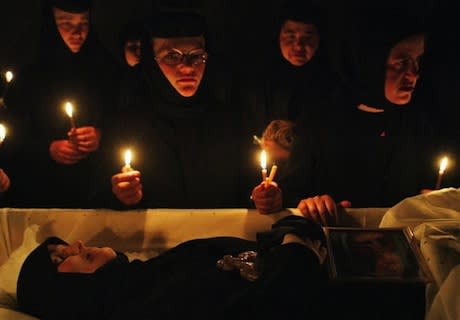Based on the true story of a failed exorcism in a remote Orthodox monastery, Cristian Mungiu's latest work, Beyond the Hills, takes what could easily be parochial or incidental and deconstructs the array of social forces leading up to the event. He's concerned with how actions are shaped by a religious and inherently patriarchal system of beliefs, much as he was with Communism and its oft-impractical application in 4 Months, 3 Weeks, 2 Days.
Stylistically, the same protracted takes and handheld aesthetic propel the slow-building narrative, framing the reunion of young nun Voichita (Cosmina Stratan) and ex-lover Alina (Cristina Flutur) with an observant, unbiased eye. Having lived together in an orphanage growing up, Voichita has since turned to God, joining a cult where all actions and behaviours are overseen and authorized by a manipulative priest (Valeriu Andriuta), while Alina has just returned from a barmaid job, intent on helping her lover flee from Romania.
In a way, Mungiu has constructed a lesbian love story as filtered through the eyes of God. The young nun has confessed her sins and has resigned herself to living out her days as a servant of an inherently male system of beliefs. Her ex-lover is unwilling to give up on their bond, convinced she can knock some sense into her deluded, parroting friend.
But this isn't the perspective presented in the film. Alina is criticized, along with society in general, for travelling to different parts of the world and having her head filled with divergent beliefs. The world of Beyond the Hills is that of the monastery, where this obstinate, wilful girl is expected to confess her sins and merely acquiesce to God.
In theory, she could just leave, but in refusing to give up her lover, she vacillates between hostility and faux compliance, claiming to accept God as long as it means she doesn't have to leave Voichita's side.
With repeating parables about those travelling the world finding only disappointment, while those that look out their door to see God live happily in the kingdom of Heaven, the insular nature of the cult and its intense solipsism become believable. The priest and nuns genuinely believe that Alina must be possessed by evil if she confesses her sins but doesn't behave like a docile cow.
And just as Mungiu isn't content to reduce his depiction of the devout to mere villains, he isn't quick to assert that their seclusion and forced ignorance are necessarily bad. If anything, this invading external force — a young lesbian from an outside world where children kill their parents and post photos online — undoes what is ostensibly a functioning, peaceful and charitable system.
This consideration of all perspectives is what makes the works of Mungiu so thought provoking and memorable. While it would be easy to make a film about the inherent dangers of backwards religious thinking in a modern world, it's something else to observe the nature of melding past and present ideologies as equally confounding and problematic.
(Mongrel Media)Stylistically, the same protracted takes and handheld aesthetic propel the slow-building narrative, framing the reunion of young nun Voichita (Cosmina Stratan) and ex-lover Alina (Cristina Flutur) with an observant, unbiased eye. Having lived together in an orphanage growing up, Voichita has since turned to God, joining a cult where all actions and behaviours are overseen and authorized by a manipulative priest (Valeriu Andriuta), while Alina has just returned from a barmaid job, intent on helping her lover flee from Romania.
In a way, Mungiu has constructed a lesbian love story as filtered through the eyes of God. The young nun has confessed her sins and has resigned herself to living out her days as a servant of an inherently male system of beliefs. Her ex-lover is unwilling to give up on their bond, convinced she can knock some sense into her deluded, parroting friend.
But this isn't the perspective presented in the film. Alina is criticized, along with society in general, for travelling to different parts of the world and having her head filled with divergent beliefs. The world of Beyond the Hills is that of the monastery, where this obstinate, wilful girl is expected to confess her sins and merely acquiesce to God.
In theory, she could just leave, but in refusing to give up her lover, she vacillates between hostility and faux compliance, claiming to accept God as long as it means she doesn't have to leave Voichita's side.
With repeating parables about those travelling the world finding only disappointment, while those that look out their door to see God live happily in the kingdom of Heaven, the insular nature of the cult and its intense solipsism become believable. The priest and nuns genuinely believe that Alina must be possessed by evil if she confesses her sins but doesn't behave like a docile cow.
And just as Mungiu isn't content to reduce his depiction of the devout to mere villains, he isn't quick to assert that their seclusion and forced ignorance are necessarily bad. If anything, this invading external force — a young lesbian from an outside world where children kill their parents and post photos online — undoes what is ostensibly a functioning, peaceful and charitable system.
This consideration of all perspectives is what makes the works of Mungiu so thought provoking and memorable. While it would be easy to make a film about the inherent dangers of backwards religious thinking in a modern world, it's something else to observe the nature of melding past and present ideologies as equally confounding and problematic.
